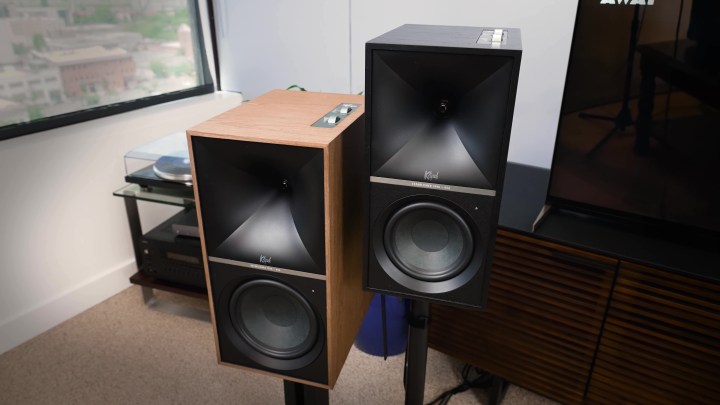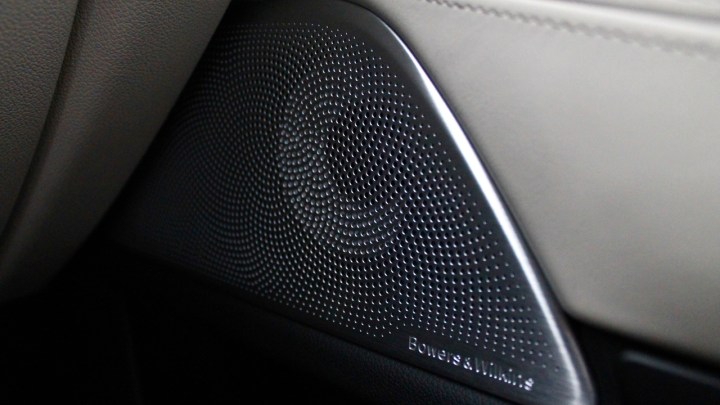In this installment of You Asked, our series that answers the Digital Trends community’s most frequently asked AV questions, we’ll talk about soundbars versus an AV receiver and speakers, whether I will ever review laser TVs/UST projectors, and why TVs can’t just come without speakers.
Soundbars vs. receivers/speakers
We’ll start with a question I’ve seen asked a lot, especially in the past couple of years.

@MarkoPosavecwrites: Soundbar versus AV Receiver: Given that nowadays there are so many soundbar options, some of which offer virtual surround sound while others go as far as to feature dedicated satellite channels, at what point do you draw the line and opt for a true AV receiver? What would be the pros and cons of either solution?
That’s a big question that deserves a big answer, so I will be dedicating a full article to this down the road. But for now, here’s my short answer:
I know I’m stating the obvious that when it comes to home entertainment, everyone’s needs and wants are different. But I think there are always three overarching considerations at play: cost, convenience, and practicality.
An AV receiver and speakers can offer some advantages that I’ll get into shortly. But they tend to pose challenges in all of those departments —- cost, convenience, and practicality. They can be tricky to set up for folks who don’t have much experience with them, they often involve a lot of wires and cables, and they tend to be bulkier. And from a practical standpoint, maybe they take up too much space, or someone else in the home is just going to veto any attempt at putting a bunch of speakers and wires around a room.
My point is, sometimes you just can’t do a receiver and speakers. That’s where soundbar systems come in. The soundbar tends to be the hub, audio signals are delivered wirelessly to surrounds and subs, amplification is built in at the speaker level, and they are just generally easier to deal with, and easier to get past the decor deputy in your home.
But that convenience and practicality offered by a soundbar-based system often come at a cost — that is, more of the money you’re spending goes into the convenience and practicality aspects than it does the quality of the components. I would say that if the convenience and practicality of the audio system are not so much a concern, you’re almost always going to be able to build a better-sounding and more capable system out of an AV receiver and speakers. That is, unless, you’re using a really inexpensive receiver and really inexpensive speakers. In those cases, you may be paying less than you would for a soundbar system that may cost more, but also sounds better. The thing is, there isn’t a clear intersection. I’d have to have specific examples of a soundbar system, and an AV receiver and speakers, to say which one might sound and/or function better than the other.
WiSA setups and laser TVs

Next, @sorenvitarelli had a couple of questions. First, Is a WiSA speaker setup a good alternative to wired speakers with a receiver?
It can be. It depends on the quality of the WiSA speakers. I’d say that if the speaker quality were equal between the two, which you could find with Klipsch, for example, then it would take a very expensive set of electronics to best the WiSA system.
Are you ever going to review “laser TVs”/UST projectors?
I have before, and I will be doing more of them going forward. Hisense has one on the way, as a matter of fact.
Speakerless TVs

@Rifumo asks: Why won’t TV manufacturers give us the option to buy TVs without speakers? Same TV, just without speakers for those of us who prefer investing in audio systems?
Well, the answer to that one is pretty simple. They won’t do it because it is complicated and it costs a lot of money. Look, I know it seems like a simple thing to do, right? Just leave out the speakers and the amplifier, yes? But it isn’t that simple. If they were to do this, they would have to create a new SKU for however many models they chose to offer without speakers — which in and of itself is a difficult decision to make. But adding new SKUs? That comes with all kinds of complications and expenses. Also, it couldn’t be called a TV anymore. It would have to be called a monitor because a TV has to have speakers. Just like a TV has to have a tuner, otherwise, you can’t call it a TV. (Just ask Vizio.)
HDMI bandwidth

@devendrasoni8572 has a trio of questions:
Is there any chance that 4K 240hz or 8K 120hz TVs are coming in the near future?
There’s always a chance, but I’d say that chance is slim to none unless you count four to five years as being in the near future. And by the way, I’m doubtful of that because — next question …
Is HDMI with more speed (like 96 gbps) or something like this coming or is there any news about it?
I have not heard anything about doubling the available bandwidth of the current HDMI spec, and considering how long it took us to get from 18 gigabits per second to 48 gigabits per second, I’m not optimistic it would be any time soon. I’d love to be proven wrong, though. Also, I think it would be better to ditch cables and go wireless if we want to add bandwidth. That seems like the right thing to do. And if we did that, I’m not sure how much HDMI would have to do with it. Anyway, current bandwidth constrictions are why I don’t think we’ll see 8K 120 or 4K 240.
Is there any native 10-bit TV out there or do all come as 8-bit with FRC?
Yes, there are many TVs with Native 10-bit panels. Too many to mention. But, like, going back a few years, the LG CX and C1 had native 10-bit panels – they did not use 8-bit + FRC.
Reviewing midrange TVs

@BR7Fan71 asks: Why do you guys neglect the midrange TVs? I’d like to see the A80L and the C3. I believe that these need just as much attention as the flagships because of the price difference.
The simple answer is that we don’t neglect midrange TVs. Look back and you’ll see I always review the A80 series from Sony and the C series from LG. I always have. Also, I don’t consider those midrange TVs. I consider The TCL Q7 or Hisense U7K midrange TVs. But the point is, I don’t neglect them.
Now, if you had asked why don’t I prioritize them? Well, there are a number of different reasons why I might review the LG G3 before the LG C3, for example. One is because the majority of viewers I’ve asked have either directly or indirectly voted for me to do the fancier TV first. I’ve asked directly, and been told by more people to do the G series first.
With all that said, I cannot believe that it has taken me this long to get a C3. I’m actually very frustrated about that. Same with the A80L. I expect both to be in within two weeks, possibly less. So those are coming.
Car stereo reviews?

@smig95 asks: Have you ever thought of reviewing car stereo systems? I would be curious to have your opinion on an array of manufacturer offerings.
I actually have done a few Pioneer systems, though those were mostly CarPlay- and Android Auto-inspired. But … I love car audio. I love it! I don’t know how many I could do due to time constraints, but I would love it if some brands reached out. Also, I’d be down to test the fancy stock systems in some nice cars – those made with Levinson, or B&W, or Focal speakers, or McIntosh amps. Did you all see the new Lotus EV? It’s got some amazing-looking KEF speakers in it — check out the MKBHD’s Auto Focus channel to see more of those. I was actually surprised Marques hadn’t heard of KEF before. I’d be happy to offer my commentary.




